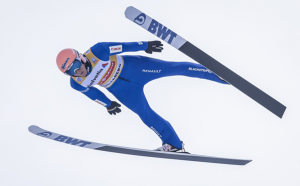Difference between revisions of "Multisensory system for performance analysis in ski jumping (M/1-2S/B)"
From iis-projects
(→Short Description) |
(→Short Description) |
||
| Line 3: | Line 3: | ||
==Short Description== | ==Short Description== | ||
| − | This project focusses on the development of an unobtrusive multisensory embedded system to | + | This project focusses on the development of an unobtrusive multisensory embedded system to assist coaches to better quantify jumping trajectories of athletes. Within the short duration of a ski-jump (< 10 seconds) and exposed to the conditions of nature (snow, wind, temperature) athletes must solve extremely difficult optimisation problems. Flight trajectories of athletes are decisive for victory in a ski jumping competition. They are influenced by the properties of the inrun, the take-off speeds, the applied forces, the athletes’ body position as well as ski edging angles during flight. |
| − | + | The challenge in this project lies in the combination and synchronization of the sensors and the wireless data transmission between the flying athlete and the coaching tower. In addition, due to the complexity of such a flight situation, the body-mounted sensors and devices must be tiny and barely perceptible to the athlete so as not to disturb his/her sensitive jumping system. | |
| − | |||
| − | |||
===Status: Available === | ===Status: Available === | ||
| Line 13: | Line 11: | ||
: Contact: [[:User:Cleitne | Christoph Leitner]] | : Contact: [[:User:Cleitne | Christoph Leitner]] | ||
===Prerequisites=== | ===Prerequisites=== | ||
| − | : | + | : Embedded systems and PCB design |
| − | : | + | : Microcontrollers |
<!-- | <!-- | ||
===Status: Completed === | ===Status: Completed === | ||
| Line 27: | Line 25: | ||
===Character=== | ===Character=== | ||
| − | : 20% | + | : 10% Literature research |
| − | : | + | : 20% Sensor interfaces |
| − | : | + | : 35% Embedded System Design |
| + | : 35% Wireless Communication | ||
===Professor=== | ===Professor=== | ||
Revision as of 15:06, 29 January 2023
Contents
Short Description
This project focusses on the development of an unobtrusive multisensory embedded system to assist coaches to better quantify jumping trajectories of athletes. Within the short duration of a ski-jump (< 10 seconds) and exposed to the conditions of nature (snow, wind, temperature) athletes must solve extremely difficult optimisation problems. Flight trajectories of athletes are decisive for victory in a ski jumping competition. They are influenced by the properties of the inrun, the take-off speeds, the applied forces, the athletes’ body position as well as ski edging angles during flight.
The challenge in this project lies in the combination and synchronization of the sensors and the wireless data transmission between the flying athlete and the coaching tower. In addition, due to the complexity of such a flight situation, the body-mounted sensors and devices must be tiny and barely perceptible to the athlete so as not to disturb his/her sensitive jumping system.
Status: Available
- Looking for 1-2 Semester/Master students
- Contact: Christoph Leitner
Prerequisites
- Embedded systems and PCB design
- Microcontrollers
Character
- 10% Literature research
- 20% Sensor interfaces
- 35% Embedded System Design
- 35% Wireless Communication
